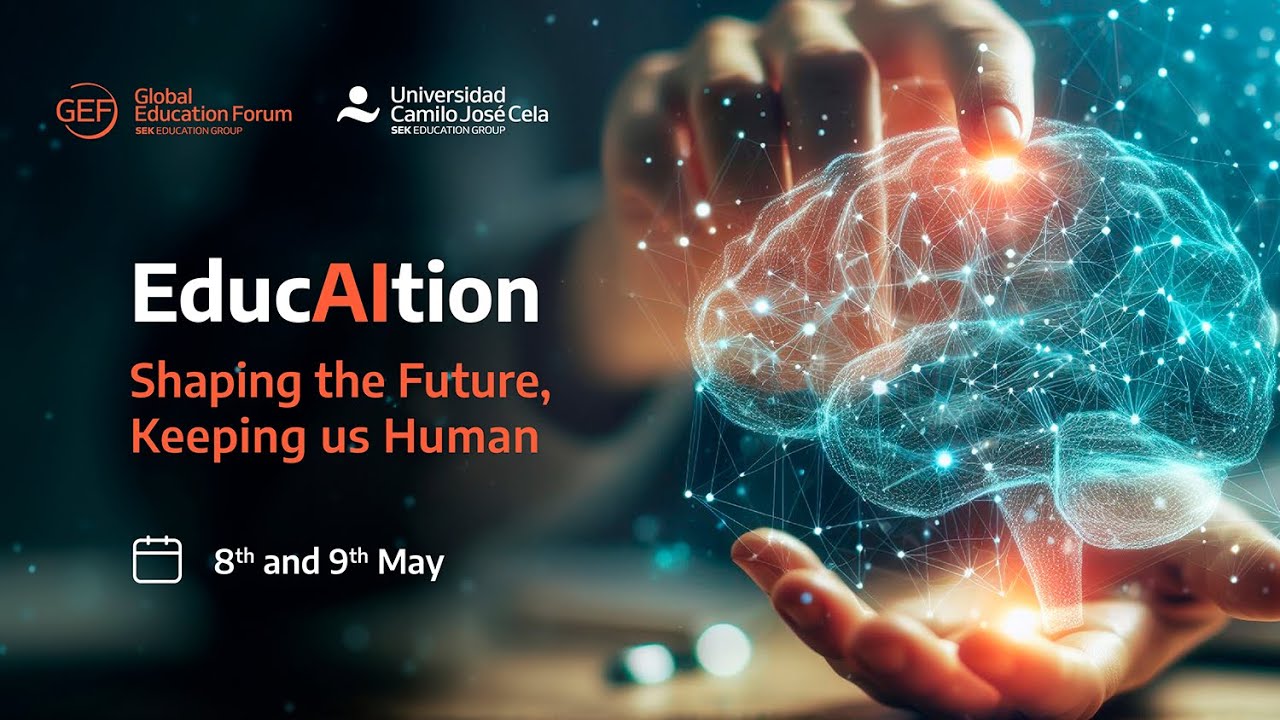Generative AI: A Conversation with Malcolm Gladwell & Darío Gil
Summary
TLDRThe discussion revolves around the transformative impact of AI on education, creativity, and society. It explores the challenges teachers face in distinguishing AI-generated content from student work and the need for new assessment methods that emphasize critical thinking. The conversation highlights differing perspectives on AI's future—optimistic and pessimistic—and compares the current AI landscape to the early days of the internet. It underscores the importance of philosophical discussions on technology's role in society and advocates for an integration of AI that enhances human experiences, ideally operating invisibly to improve productivity and creativity.
Takeaways
- 😀 AI will significantly impact the education system, particularly in writing and assessment practices.
- 📚 The introduction of AI may complicate teachers' roles, requiring new methods for evaluating student work.
- 🧮 The analogy to calculators illustrates how technologies can shift educational norms and practices.
- 🚀 There's a spectrum of opinions on AI's potential effects, ranging from optimistic to cautious perspectives.
- 💬 Philosophical discussions about values and ethics are essential as AI technology evolves.
- 🤝 Collaboration between diverse fields will be necessary to navigate the societal implications of AI.
- 🏛️ Democracy plays a crucial role in shaping how technology like AI integrates into society.
- 🔍 Effective use of AI is often when it enhances experiences seamlessly, without being obtrusive.
- 💡 The current moment in AI development is likened to the early days of the internet, indicating a significant inflection point.
- ⚖️ As AI evolves, the conversation about how to balance innovation with ethical considerations will be critical.
Q & A
What impact does AI have on traditional education methods?
-AI complicates the role of teachers, as it can generate student essays and other content, making it harder for teachers to assess student understanding. This necessitates new assessment methods that focus on critical thinking rather than rote knowledge.
How does the speaker compare the introduction of calculators to the emergence of AI?
-The speaker draws a parallel by suggesting that just as calculators prompted changes in mathematics education—focusing more on conceptual understanding—AI will lead to new educational norms emphasizing deeper thinking and creativity.
What does the speaker mean by 'new norms' in education due to AI?
-New norms refer to evolving standards and methods of teaching and assessment that will emerge as AI becomes more integrated into educational contexts, potentially prioritizing skills like critical thinking and creativity over traditional writing skills.
What is the significance of the timeline mentioned regarding AI advancement?
-The speaker indicates that the current moment is similar to the early internet days, suggesting rapid progress in AI technology. The timeline for substantial AI-driven changes could span from five to twenty years, depending on societal adaptation.
What role do philosophical discussions play in the AI revolution?
-Philosophical discussions are crucial for navigating the implications of AI, especially concerning values, ethics, and the responsibilities of technology creators. These conversations help define how society interacts with technology and its impact on human arrangements.
How does the speaker view technological determinism?
-The speaker critiques technological determinism, arguing that technology should not dictate societal norms or outcomes. Instead, there should be a focus on what society collectively wants and how technology fits within that framework.
What responsibilities do technology creators have beyond their technical contributions?
-Technology creators have a responsibility as citizens to consider the ethical implications of their work. They must engage in discussions about justice, democracy, and societal values, ensuring their technology serves the broader good.
How does AI change the way society might view human actions?
-The speaker warns against attributing human actions to AI, suggesting that while AI can enhance processes, it is essential to recognize the human and institutional contexts that drive decisions and behaviors.
What does the speaker mean by 'invisible AI'?
-Invisible AI refers to AI technology that operates seamlessly in the background, improving user experiences without drawing attention to itself. The speaker suggests that this unobtrusive use of AI is often the most effective.
What is the relationship between AI and creativity in professional fields?
-AI introduces challenges in creative fields, prompting discussions about credit distribution, authorship, and the role of human creativity in the face of AI-generated content. This raises important questions about how creative professions will adapt.
Outlines

このセクションは有料ユーザー限定です。 アクセスするには、アップグレードをお願いします。
今すぐアップグレードMindmap

このセクションは有料ユーザー限定です。 アクセスするには、アップグレードをお願いします。
今すぐアップグレードKeywords

このセクションは有料ユーザー限定です。 アクセスするには、アップグレードをお願いします。
今すぐアップグレードHighlights

このセクションは有料ユーザー限定です。 アクセスするには、アップグレードをお願いします。
今すぐアップグレードTranscripts

このセクションは有料ユーザー限定です。 アクセスするには、アップグレードをお願いします。
今すぐアップグレード関連動画をさらに表示

ندوة شبكات الانترنت

Generative A.I. in Education | Dimitri Andronikos-Emiris | TEDxGEMSWellingtonAcademyAlKhail

AGI House: Lessons from Hundreds of Launched AI Projects

GEF Madrid 2024: Navigating AI Legal Frontiers

There is no easier explanation than this, 'Chat GPT' (Hong Jin Kyung, Unreal Science, Orbit)

Concept and History of Sociology
5.0 / 5 (0 votes)
